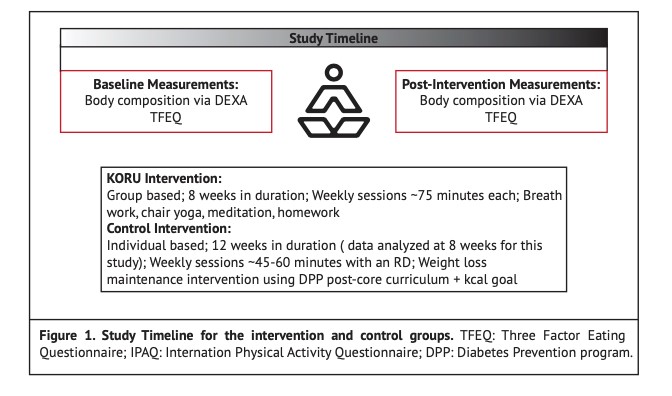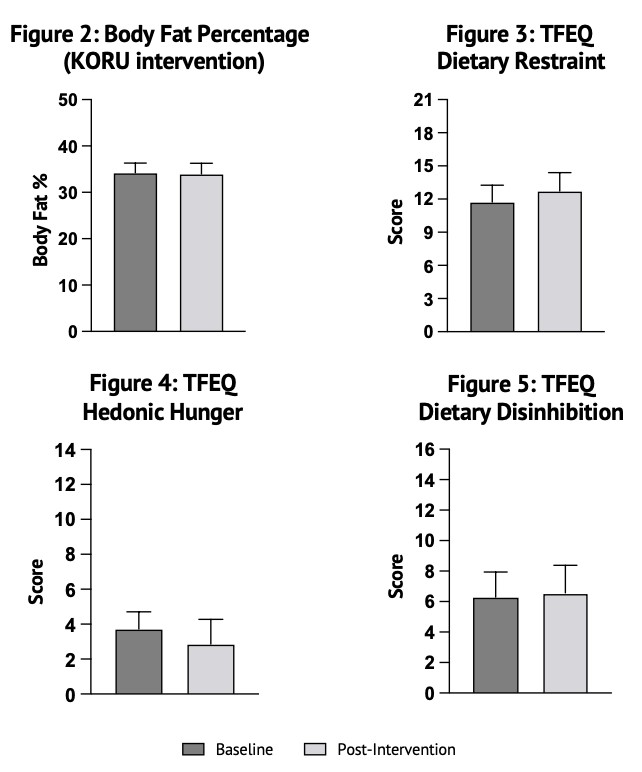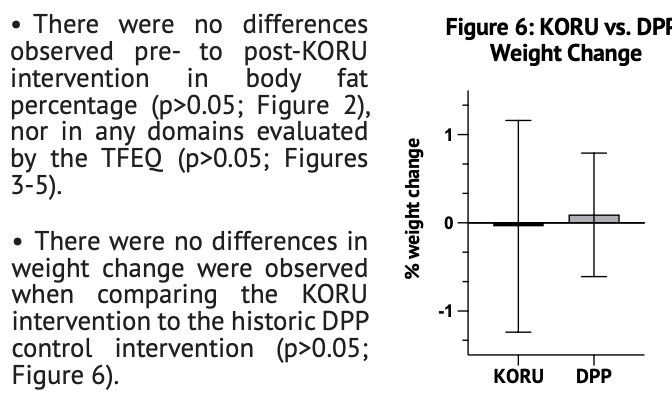College of Health
41 A Feasibility Trial to Determine the Effect of Mindfulness on Weight-Loss Maintenance
Jaclynn K. Smith; Selene Tobin; Marc-Andre Cornier; and Tanya Halliday (Health, Kinesiology, and Recreation)
Faculty Mentor: Tanya Halliday (Health and Kinesiology, University of Utah)
PURPOSE
Over 70% of all adults in the U.S. have overweight and obesity. Weight loss is often recommended to improve overall health and risk of disease. However, weight regain following intentional weight loss is common and diminishes initial improvements. Therefore, interventions aimed at attenuating weight regain following weight loss are of crucial importance. Mindfulness-based interventions are a promising and novel approach in mitigating weight re-gain. Therefore, the aim of this study was to investigate the effects of a mindfulness intervention to prevent weight regain in weight-reduced adults. METHODS: Women (age 40.2 ± 10.8; BMI: 31.6± 5.2) who recently achieved a 7% reduction in body mass within the past 2 months were enrolled into an 8-week KORU mindfulness-mediation, plus daily meditation homework. At baseline and post-intervention body mass, dietary restraint, disinhibition, and hedonic hunger (via the Three-Factor Eating Inventory); and physical activity (via IPAQ) were evaluated. To compare change in body mass to a standard weight loss maintenance intervention (Diabetes Prevention Program [DPP]Post Core Curriculum) 8-week weight loss data from historic controls matched on age, sex, and BMI (n=5) was utilized. RESULTS: Weight loss was maintained following the 8-week KORU mindfulness group from pre- to post-intervention for dietary restraint (pre: 11.7 ± 4.1; post: 12.7±4.5; p=0.27), disinhibition (pre: 6.3 ± 4.4; post:6.6 ± 4.8; p=0.69), or hedonic hunger (pre: 3.7 ±2.6; 2.9 ± 3.8; p=0.29). Additionally moderate-to-vigorous physical activity (pre: 121141.1 ± 8706.3 METmins/week; post: 7422 ± 5842.8 METmins.week; p=0.17) and sedentary time (pre: 4274.3 ± 1544.9 min/week; post: 2655.7 ± 1508.8 min/week; p=0.43) were also not changed following the KORU intervention. CONCLUSIONS: Mindfulness-interventions are feasible and an efficacious approach to short-term weight loss-maintenance. Future trials that include matched controls and longer term follow up are needed.
INTRODUCTION
- Weight-loss maintenance following significant weight loss is an often-neglected period of weight loss interventions. Frequently, within two years of weight loss, nearly half of weight is regained, and up to 80% of weight is regained within five years1.
- Mindfulness meditation is a formal practice of mental training that can lead to the use of mindfulness in informal settings2.
- Mindfulness has shown positive results as a complement to traditional medical and psychological treatments2,3, and is therefore an intervention of interest for the weight-maintenance phase.
METHODS
PARTICIPANTS: Females (n=7) who recently experienced significant weight loss (age: 40.3 ± 3.8 years; BMI before weight loss (age: 31.6 ± 1.9 kg/m2; BMI after weight loss: 27.5 ± 1.5 kg/ m2) participated in an 8-week KORU mindfulness intervention.
STATISTICAL ANALYSIS: Paired t-tests were used to compare pre-post data. SPSS was used for all analysis. Alpha was set at <0.05. All data is shown as average ± standard error mean. Graphpad PRISM was used to display results.
Baseline Measurements: We evaluated Body composition via DEXA Three Factor Eating Questionnaire (Figure 1).
Post-Intervention Measurements: Body composition via DEXA Three Factor Eating Questionnaire (Figure 1).
The KORU Intervention as well as a Control intervention was used to evaluate weight-loss maintenance while being given a mindfulness curriculum (Figure 1).

RESULTS
- There were no differences observed in pre- to post-KORU intervention in body fat percentage (p>0.05; Figure 2), nor in any domains evaluated by the TEQ (p>0.05; Figures 3-5).

- There were no differences in weight change observed when comparing the KORU intervention to the historic DPP control intervention (p>0.05; Figure 6).

CONCLUSIONS
- Body Composition did not change following the KORU mindfulness intervention, and body weight was not statistically different than the DPP control group at 8-weeks.
- Dietary restraint, disinhibition, and hunger did not change following the intervention.
- These data suggest mindfulness to be am intervention of interest during the weight maintenance period to maintain clinically significant weight loss.
REFERENCES
- Hall KD, Kahan S. Maintenance of Lost Weight and Long-Term Management of Obesity. Med Clin North Am. 2018;102(1):183-197.doi:10.1016/j.mcna.2017.08.012
- Grossman P, Niemann L, Schmidt S, Walach H. Mindfulness-based stress reduction and health benefits: A meta-analysis. Journal of Psychosomatic Research. 2004;57(1):35-43.
- Wielgosz J, Goldberg SB, Kral TRA, Dunne JD, Davidson RJ. Mindfulness Meditation and Psychopathology. Annu Rev Clin Psychol. 2019;15:285-316.doi:10.1146/annurev-clinpsy-021815-093423

